| Srl | Item |
| 1 |
ID:
118279
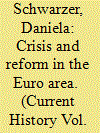

|
|
|
|
|
| Publication |
2013.
|
| Summary/Abstract |
A major challenge for policy makers lies in the fact that they may have to move forward with a deepening of integration at a time when the EU and the euro area confront a growing crisis of acceptability.
|
|
|
|
|
|
|
|
|
|
|
|
|
|
|
|
| 2 |
ID:
150420
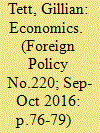

|
|
|
| 3 |
ID:
119876
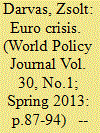

|
|
|
|
|
| Publication |
2013.
|
| Summary/Abstract |
Brussels-High unemployment, bleak economic outlook, high public and private debts, dysfunctional banks, weak competitiveness, and an unfavorable external environment are just a few of the challenges facing southern members of the euro zone. Despite these hurdles, the ever-optimistic European Council and other leaders said in January that the euro crisis had bottomed out. Herman Van Rompuy, the president of the European Council, proclaimed, "The worst is behind us, in particular the existential threat to the euro." Then there was Mario Draghi, president of the European Central Bank (ECB), who declared that "the darkest clouds over the euro area [have] subsided."
|
|
|
|
|
|
|
|
|
|
|
|
|
|
|
|
| 4 |
ID:
128841


|
|
|
|
|
| Publication |
2014.
|
| Summary/Abstract |
Germany's highest court stopped short of ruling the European Central Bank's programme to support the euro illegal. Now the European Court of Justice must find a way to make the programme acceptable without making it ineffective.
|
|
|
|
|
|
|
|
|
|
|
|
|
|
|
|
| 5 |
ID:
138179
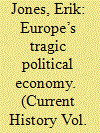

|
|
|
|
|
| Summary/Abstract |
The World Bank issued a report in January warning that the European economy is slipping toward “secular stagnation,” a prolonged period of very low inflation and very low growth. Should it come to pass, this development will have a profound impact on all aspects of the region. It will lower opportunities for each successive generation while at the same time increasing pressure on European governments to curtail the welfare state. It will make it easy for populist political movements (and political entrepreneurs) to rally opposition to traditional political parties, governing elites, and national constitutional arrangements.
|
|
|
|
|
|
|
|
|
|
|
|
|
|
|
|
| 6 |
ID:
108953
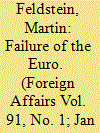

|
|
|
| 7 |
ID:
144612
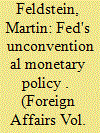

|
|
|
|
|
| Summary/Abstract |
Now, almost a decade after the Great Recession hit, the story of its origins and course has become familiar. It began in December 2007, soon after the U.S. housing bubble burst, triggering the widespread collapse of the U.S. financial system. Credit dried up, as banks lost confidence in the value of their assets and stopped lending to one another. Consumer spending plummeted. At first, the U.S. Federal Reserve tried to boost spending through traditional monetary policy [1], by reducing short-term interest rates. Yet this proved ineffective, even though short-term interest rates fell close to zero. The government then turned to fiscal stimulus [2], with Congress passing a package of tax cuts and spending increases in 2009, but this, too, proved ineffectual.
|
|
|
|
|
|
|
|
|
|
|
|
|
|
|
|
| 8 |
ID:
164353
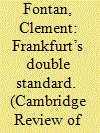

|
|
|
|
|
| Summary/Abstract |
In this article, I examine the bias in favour of financial markets displayed by the European Central Bank (ECB) during the Eurozone crisis. Having analysed the roots of the ECB’s bias, I explore the discrepancy between the conditionality of ECB financial support that is directed towards states and that which is directed towards markets. On the one hand, the ECB has exerted strong coercive and cognitive pressures to reform Eurozone economic governance in a market-friendly way. On the other hand, it has employed monetary measures to save large Eurozone banks from a complete meltdown without controlling how these banks use their provided liquidities. I conclude by stressing the democratic problems engendered by the ECB’s bias.
|
|
|
|
|
|
|
|
|
|
|
|
|
|
|
|
| 9 |
ID:
110300
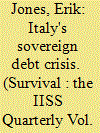

|
|
|
|
|
| Publication |
2012.
|
| Summary/Abstract |
The bond markets turned on Italy in July 2011 as part of a wider loss of confidence in European efforts to manage the sovereign debt crisis. The centre-right government headed by Prime Minister Silvio Berlusconi attempted to head off this change in sentiment by pushing through a package of reforms to promote fiscal consolidation and to stimulate growth. Bond traders shrugged off those actions as too little and too late.
The wider European context played an important role in that assessment. The heads of state and government of the eurozone were already struggling to come up with a second Greek bailout package at the start of the summer. This resulted not only in bitter fights within countries such as Slovakia, Finland and the Netherlands, but also further scrutiny of borrowers in Ireland, Portugal and Spain. Then the European Banking Authority published the results of its second round of stress tests for systemically important European banks. These were designed to calm the markets by factoring in losses on sovereign debt instruments and generating huge volumes of data on cross-border exposure. Instead, the tests merely underscored the belief that the whole European financial system remained fragile.
|
|
|
|
|
|
|
|
|
|
|
|
|
|
|
|
| 10 |
ID:
116658
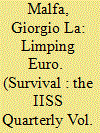

|
|
|
|
|
| Publication |
2013.
|
| Summary/Abstract |
The Maastricht Treaty of 1992 launched European Monetary Union, outlining a three-phase process towards the euro. The first two stages were preparatory and focused on the new system's organisational aspects, with special reference to the workings of the European Central Bank and economic and financial convergence among candidate members. Convergence, based on the so-called Maastricht criteria, would decide which countries were to be allowed to take part in the third and final phase of the EMU. That phase began on 1 January 1999 when, for the 11 countries that had met the criteria, monetary policy was transferred from national central banks to the ECB. Greece joined later, and the start of 2002 saw the changeover from the 12 national currencies to the euro. By then, Europe's boldest project since the integration process of the 1950s was fully in place.
|
|
|
|
|
|
|
|
|
|
|
|
|
|
|
|
| 11 |
ID:
110962
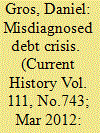

|
|
|
|
|
| Publication |
2012.
|
| Summary/Abstract |
A few nations' public debt problems have become a systemic, area-wide financial crisis because of the fragility of the European banking system.
|
|
|
|
|
|
|
|
|
|
|
|
|
|
|
|
| 12 |
ID:
118065
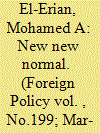

|
|
|